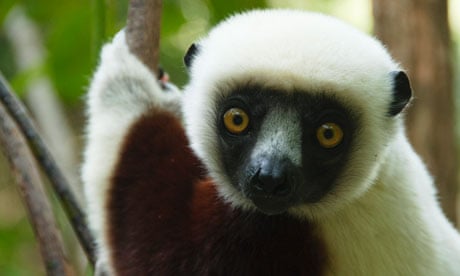Sir Richard Branson has triggered a conservation row over a plan to import lemurs to the Caribbean, half a world away from their natural habitat in Madagascar.
The British entrepreneur said ringtailed lemurs would be transported and released into the rainforest of Moskito island, a tropical hideaway he owns in the British Virgin Islands.
Branson said he wanted to help conserve a species threatened by deforestation in Madagascar, off Africa's Indian Ocean coast, where political turmoil has accelerated illegal logging.
"We have had a lemur project in Madagascar the past few years and seen that things are getting worse for them so we thought about finding a safe haven," he told the Guardian. "We brought in experts from South Africa to Moskito island and they said it would be perfect."
But other experts say the introduction of an alien species from 8,000 miles away could harm the lemurs and local wildlife.
The International Union for the Conservation of Nature's species survival commission told the BBC the project could contravene its code for translocations and said the harm from introducing species outweighed benefits.
Other experts said it was too soon to judge. "It could be a brilliant or terrible idea but we just don't know yet," said Penelope Bodry-Sanders, the founder of Lemur Conservation Foundation, a Florida-based group which has a sister reserve in Madagascar.
"We don't know what pathogens the lemurs will bring to the Caribbean or what pathogens they will receive. It is great that Mr Branson cares, and he has a history of acting responsibly, but we need more information. The jury is out on this."
Branson said the lemurs would come from zoos in Canada, Sweden and South Africa, not Madagascar, and that an environmental impact assessment had been carried out on Moskito, part of a 60-island archipelago. Its 50 hectares are home to the stout iguana, the turnip-tailed gecko and the dwarf gecko, among other reptiles.
If lemurs thrive on Moskito, it is hoped that some can later be reintroduced to Madagascar.
Branson bought the island in 2007 for £10m and pledged to turn it into the world's most ecologically friendly resort.
Authorities on the British Virgin Islands have approved the plan and the first shipment of 25 ringtailed lemurs is due within weeks. The red-ruffed lemur is expected to follow, possibly followed by another primate, sifakas.
Bodry-Sanders said the red-ruffed lemurs, which are among the most at risk in Madagascar, could suffer from the Caribbean heat but said the ringtails could thrive in it.
British Virgin Island residents are more concerned that indigenous plants and wildlife, especially insects and birds' eggs, could suffer from "opportunistic predators" who are adept at leaping, clawing and munching.
"This monkey business shows a distressing disregard for the advice and concerns expressed by both local and international scientists," said one commentator on BVInews.com.
Another message said: "Those lemurs will spread to other islands in no time and then what?"
Critics accused the island authorities of bowing to a powerful investor.
Branson acknowledged there were risks but said experts had advised they were minimal compared with the upside of "saving a species that was dying out".
Fears for Moskito's gecko population were misplaced, he said. "Lemurs eat mostly nuts and plants. If they eat the occasional gecko, well there are literally thousands and thousands of them."
Local species would be protected if they turned out to be threatened by the new arrivals, he said.
"We will have to play it by ear. If this works out well, we will bring in more lemur species and eventually hope to find a bigger island for them."
